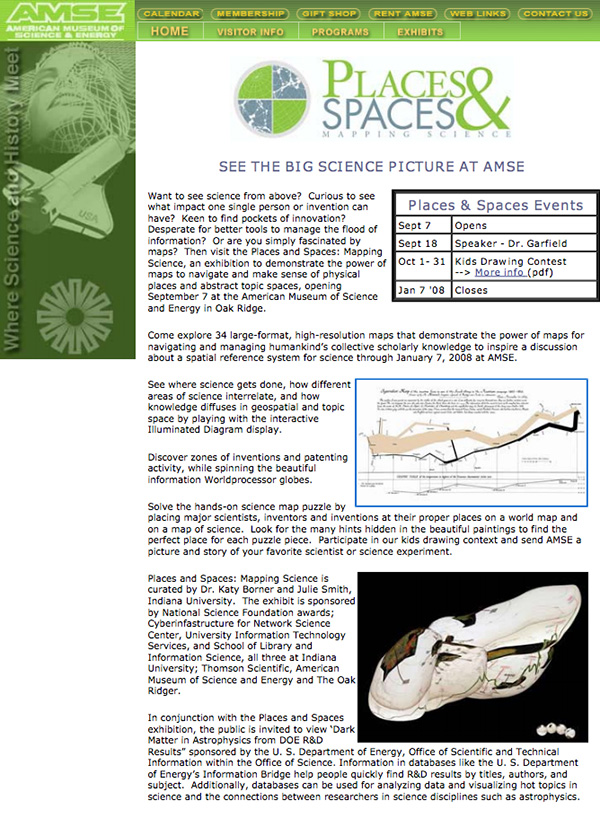Places and Spaces: Mapping Science
| American Museum of Science and Energy

The following is an article from the American Museum of Science and Energy. Download a PDF of the original article here.
Want to see science from above? Curious to see
what impact one single person or invention can
have? Keen to find pockets of innovation?
Desperate for better tools to manage the flood of
information? Or are you simply fascinated by
maps? Then visit the Places and Spaces: Mapping
Science, an exhibition to demonstrate the power of
maps to navigate and make sense of physical
places and abstract topic spaces, opening
September 7 at the American Museum of Science
and Energy in Oak Ridge.
Come explore 34 large-format, high-resolution maps that demonstrate the power of maps for
navigating and managing humankind’s collective scholarly knowledge to inspire a discussion
about a spatial reference system for science through January 7, 2008 at AMSE.
See where science gets done, how different
areas of science interrelate, and how
knowledge diffuses in geospatial and topic
space by playing with the interactive
Illuminated Diagram display.
Discover zones of inventions and patenting
activity, while spinning the beautiful
information Worldprocessor globes.
Solve the hands-on science map puzzle by
placing major scientists, inventors and inventions at their proper places on a world map and
on a map of science. Look for the many hints hidden in the beautiful paintings to find the
perfect place for each puzzle piece. Participate in our kids drawing context and send AMSE a
picture and story of your favorite scientist or science experiment.
Places and Spaces: Mapping Science is
curated by Dr. Katy Borner and Julie Smith,
Indiana University. The exhibit is sponsored
by National Science Foundation awards;
Cyberinfastructure for Network Science
Center, University Information Technology
Services, and School of Library and
Information Science, all three at Indiana
University; Thomson Scientific, American
Museum of Science and Energy and The Oak
Ridger.
In conjunction with the Places and Spaces
exhibition, the public is invited to view ‘Dark
Matter in Astrophysics from DOE R&D
Results” sponsored by the U. S. Department of Energy, Office of Scientific and Technical
Information within the Office of Science. Information in databases like the U. S. Department
of Energy’s Information Bridge help people quickly find R&D results by titles, authors, and
subject. Additionally, databases can be used for analyzing data and visualizing hot topics in
science and the connections between researchers in science disciplines such as astrophysics.





